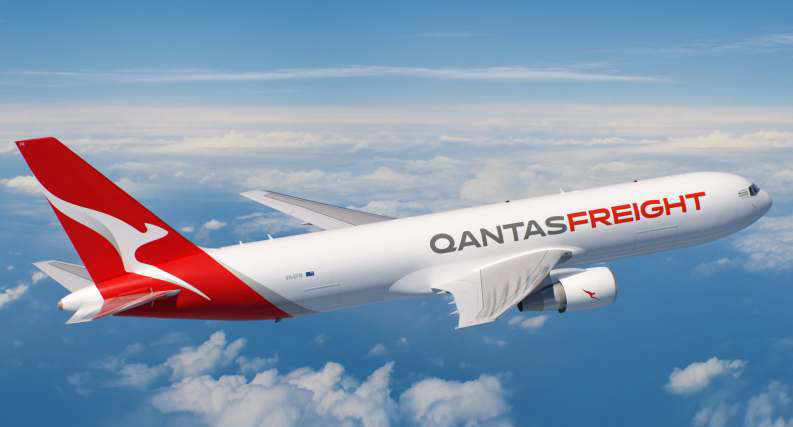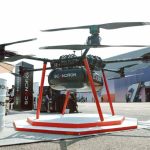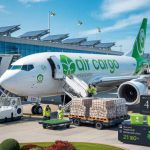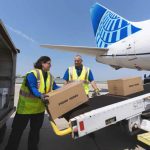Qantas Freight's resilience and growth in the face of global challenges
According to Mordor Intelligence, the Logistics Automation Market size is estimated at USD 75.24 billion in 2024. It is expected to reach USD 120.63 billion by 2029, growing at a CAGR of 9.90% during the forecast period—2024-2029.
Australia’s freight and logistics market size this year is valued at USD 94.10 billion. Growing at a CAGR of 3.9% during the forecast period (2024-2029), it is estimated to reach USD 113.94 billion by 2029. (Mordor Intelligence)
It has been a turbulent year for airfreight transporters in Australia yet there is optimism the country’s freight and logistics market will steadily grow in the coming years.
During the COVID-19 pandemic, just like the rest of the world, Australia’s aviation industry suffered from the global travel ban, reducing tremendously belly-hold capacity for cargo. Yet, it’s air freight industry carried through the tough times, delivering vital healthcare supplies and other basic needs throughout the country.
Faced with weaker tonnage volumes, global supply chain disruptions pushed airfreight prices to record levels. But from 2023, airfreight prices have begun to normalize as global supply chain disruptions eased, while volumes remain below pre-pandemic levels.
In the past 35 years, Australia’s road transport activity has grown significantly due to expanding road networks and increased economic activity, resulting in a seven-fold increase in road freight between 1970 and 2007 and an eight-fold increase between 1970 and 2020.
Australia’s economy relies heavily on freight transport to move raw materials, semi-processed goods, and finished products. During the COVID-19 pandemic, the freight industry managed to maintain key supply chains, demonstrating its importance and resilience.
Australia’s freight and logistics market size is currently estimated at USD 94.10 billion this year. It is expected to reach USD 113.94 billion by 2029, growing at a CAGR of 3.9% during the forecast period (2024-2029) (Mordor Intelligence).
A representative from Qantas Freight who asked to be anonymous but agreed to provide a comprehensive outline of how Qantas Freight managed to establish itself as the leader in the Australian air cargo industry talks to Air Cargo Update.
Strong focus on efficiency and reliability
With a strategic approach and a strong focus on efficiency, reliability, and customer satisfaction, Qantas Freight has secured its position as a leader in the Australian market.
By continuously investing in cutting-edge technologies, expanding its global network, and providing top-notch services, Qantas Freight has set the standard for excellence in air cargo transportation.
One of the oldest airlines in the world, Qantas Airways Limited was founded in Winton, Queensland, on November 16, 1920.
Originally named Queensland and Northern Territory Aerial Services Limited, the airline operated its first flight in 1922 with the first scheduled services connecting regional towns in Queensland.
The airline quickly expanded its operations to include airmail and eventually pioneered long-distance flights across the globe.
What hasn’t changed over the years is their commitment to safety and customer service. According to the Qantas Freight interviewed in this article, any discussion about the company’s domination in the air cargo industry cannot ignore its strategic expansion and acquisition initiatives.
Over the years, Qantas Freight has strategically expanded its network to cover key international trade routes, connecting major cities worldwide. Through a series of strategic acquisitions and partnerships, Qantas Freight has strengthened its market presence and service offerings, solidifying its position as a global leader in air cargo transportation.
Qantas Freight spokesperson said, “Qantas Freight is Australia’s largest independent air freight carrier and has been handling a diverse range of goods from mail and e-commerce to pets and fresh produce and bulkier specialist items like cars, helicopters and farm machinery for more than a century. Our services provide a critical link in domestic and international supply chains, moving 4000 daily shipments to more than 500 destinations worldwide.”
Advanced Logistics and Technology Infrastructure
Qantas Freight’s advanced logistics and technology infrastructure play a pivotal role in its dominance in the air cargo industry.
Through cutting-edge technology and streamlined logistics processes, Qantas Freight ensures seamless operations and real-time tracking of shipments.
This enhances efficiency and enables the airline to meet the evolving needs of customers in a highly competitive market. Technology Infrastructure; Advanced tracking systems, and; Real-time data analytics.
Infrastructure:Modern warehouses and handling facilitiesState-of-the-art security systemsSpecialized cargo handling equipmentIntegrated IT systems for seamless operations
“Advanced logistics and technology infrastructure are integral pillars of our strategy, enabling Qantas Freight to deliver unparalleled efficiency and reliability in the air cargo industry.”
With the largest footprint of terminal infrastructure in the region, Qantas Freight is creating world-leading digital solutions to evolve the traditional ground handling experience.
Express check iPad kiosks.
Integrated online booking, lodgement, and collection processes via mobile apps to remove paper processing wherever possible. Real-time tracking and notifications to provide shipment visibility at every stage of the terminal process.
Integrated scales and labelling systems are in place at all our terminals, improving accuracy for safer operations.
“Our fleet of dedicated freighter aircraft, including B737F, B767F, A321P2F, and A332P2F, serves as the backbone of our cargo operations, seamlessly complementing our belly space capacity for both domestic and international flights.
“With strategically positioned cargo terminals equipped with state-of-the-art tracking technologies, we ensure swift tail-to-tail connections and real-time visibility of freight at every stage of its journey.
“Our specially trained teams, stationed at major airports across Australia, bring expertise in complex load build-ups and handle a diverse range of freighter aircraft types with precision and efficiency.”
Meeting Online Shopping Demand
To meet e-commerce demand from its customers across Australia, Qantas Freight is in the works to add six Airbus A321 aircraft to its domestic fleet.
A structural shift towards online shopping has driven a step change in cargo volumes for the national carrier’s freight division since COVID-19 began.
Five Boeing 737 freighters approaching the end of their economic lives will be replaced by six A321s between the beginning of the 2024 calendar year and the middle of 2026.
In comparison with the older 737 freighters, the A321 freighters can carry 23 tons of cargo, nine tons more, and consume 30% less fuel per ton.
“Demand for Qantas Freight services has been stronger than ever in recent years thanks to online shopping trends, and our fleet investments will ensure we’re able to continue to meet this rising demand well into the future,” the spokesperson said.
According to the then CEO of Qantas Group Alan Joyce, who stepped down from his CEO role in September 2023, “Qantas Freight has been one of the standout performers for the Group during the pandemic as Australians rapidly shifted to online shopping. While some of that shift is temporary, demand remains well above pre-pandemic levels even with the lifting of almost all COVID-related restrictions.
“This is one of the largest ever investments in our domestic freight fleet, which will enable Qantas Freight to capture more of that demand and will provide the opportunity to help Freight further grow revenue and earnings.
“The first three A321P2F have been a fantastic addition to our fleet and operating a single type of narrow-body aircraft in the future will enable us to generate further operational efficiencies and significantly reduce emissions per tonne of freight flown.”
Looking Ahead
Looking ahead – initiatives being rolled out across Qantas Freight include: A new capacity management system to ensure they maximize uplift on capacity-constrained routes.
Investments in a new fleet of fire-retardant unit load devices – game-changers in the industry which further add to onboard safety.
Working with airport authorities across the nation to develop plans for terminal infrastructures from 2025 including Western Sydney.
Australia’s new cargo hub
Western Sydney International Airport (WSI) will fulfill the growing demand for aviation capacity in the Sydney basin and enhance accessibility to flights for people in Western Sydney as well as provide economic opportunities for businesses.
The airport will serve domestic and international flights from 2026, making it one of Australia’s most significant infrastructure projects in decades.
In addition to the greenfield airport, there is a 3.7-kilometer runway, terminal, and airport facilities that will initially serve up to 10 million passengers a year and a capacity of 220,000 tons of cargo annually.
WSI is Australia’s first co-designed cargo precinct.
There is no doubt that WSI will become one of Australia’s most important cargo hubs. Aside from motorway access to Western Sydney’s logistics centers and 24/7 operations, the Cargo Precinct planned has a crucial element that Sydney’s been lacking: growth room.
Air cargo, logistics, support, and commercial uses will be accommodated at WSI Cargo Precinct, both immediately and over time.
A flexible, future-proofed layout will be provided by the WSI Cargo Precinct to meet the demands and trends of the future. It is planned to be one of the best cargo precincts in the world that will be thriving, safe, sustainable, and a great place to work and operate.
Safe Pet Handling
When it comes to the safe and comfortable travel of pets and other animals, Qantas Freight prioritizes their welfare above all else.
From dogs and cats to rabbits, and domestic birds, Qantas Freight ensures their journey is smooth and stress-free.
“Every year, we transport thousands of beloved pets and animals to destinations spanning Australia and beyond, ensuring their safe and comfortable journey every step of the way. Our expertise extends beyond household pets to encompass the specialized movement of diverse animals, from reptiles to racehorses, zoo residents, and marine life destined for research or aquariums, all of which demand meticulous handling and care.
“From fresh perishables like food and flowers to critical pharmaceuticals such as medicines and blood samples, as well as highly secure items like delicate artworks and custom goods like racing cars, we handle a wide range of cargo with precision and reliability.”
With Qantas Freight, pet owners can rest assured knowing that their beloved companions are in good hands throughout the entire travel process.














